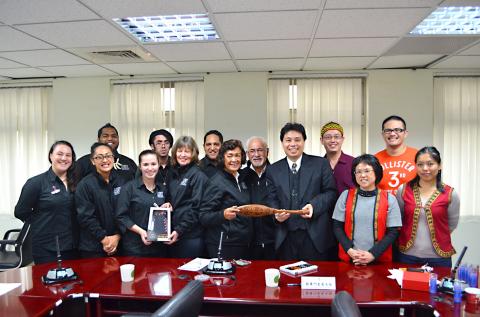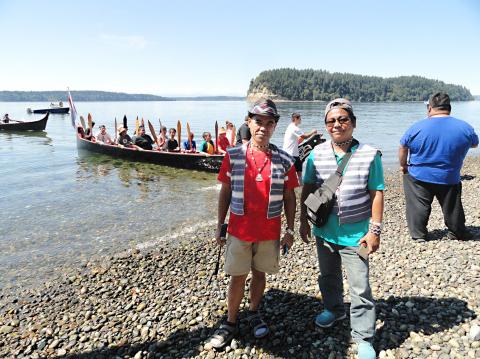ATAYAL aims to launch a new online communication platform to increase dialogue and relations among Aboriginal communities across the globe through media projects, cultural exchanges and tourism, while creating sustainable economic opportunities.
The nonprofit will change their name later this year to “Indigenous Bridges” as a rebranding strategy to emphasize the creation of this digital networking platform, said Tony Coolidge, director of ATAYAL.
Coolidge, whose mother is of Atayal descent, is no stranger to building digital networking platforms. In 2005, after Hurricane Katrina brought much devastation to the US gulf coast, he created the site, KatrinasAngels.org, a database of over 500,000 people that connected victims to volunteers offering housing and aid. A similar approach will be employed in ATAYAL’s online network.

Photo courtesy of Tony Coolidge
“The creation of a system of information management and resource management is something I have been doing for years with other companies and projects. Applying it to indigenous cooperation and development, which is my mission in life, should have been done long ago,” Coolidge said.
SOLVING PROBLEMS
With better online communications and international cooperation among Aboriginal communities, it is possible to solve the problems they face, including discrimination, marginalization and extreme poverty. Aboriginal culture, languages, belief systems and ways of life are under threat, and in some cases have become extinct.

Photo courtesy of Gary Smoke
Even though each Aboriginal communities throughout the globe have their own unique concerns, they share similar historical experiences and contemporary issues of how to balance tradition and modernity, said Daya Dakasi, an Atayal and National Chengchi University associate professor of ethnology. He added that through cross-cultural collaboration, Aboriginal communities can share their experiences and learn from others to help them adopt new practices.
“Even if there are no successful cases, we can establish supporting systems for each other,” Daya said.
In order to alleviate these problems, ATAYAL’s database will feature a user-friendly interface where users can find each other and in turn, more projects can be achieved.

Photo courtesy of Tony Coolidge
“There will also be regular online newsletters and online forums to encourage regular communication between the tribal representatives,” Coolidge said.
Members will be able to look for performers for cultural events, academics and specialists for conferences, tourism opportunities and Aboriginal representatives.
“Our hopes are that by tribes working together they can further their own personal relationships and their own culture,” said Gary Smoke, director of international relations at ATAYAL.
ATAYAL will also continue various side projects that focus on strengthening and establishing relationships with other Aboriginal communities. The organization’s side projects include an annual canoe journey with Native American tribes of the US Pacific Coast, collaboration with other organizations to increase tourism to local Aboriginal villages in New Taipei City’s Wulai District (烏來) and Chiayi County’s Alishan Township (阿里山) and inviting delegations from other nations to visit and participate in cross-cultural exchange with Taiwanese Aboriginal communities.
In particular, the canoe journey has been beneficial to ATAYAL because it has strengthened relations between Taiwanese Aboriginal communities and Pacific tribes of the US, said Smoke. The Native Americans were willing to share their resources and knowledge to help Taiwanese Aborigines solve problems surrounding governmental support and environmental policies, he added.
Tana Yagu, an Atayal who is the nonprofit’s cultural ambassador and canoe journey organizer, said the journey can start a cross-cultural dialogue.
“The benefit to meeting in person ... is to learn really deeply, but also build the connections and relationships that make it possible for coalition building, for advocating on each other’s behalf and to highlight our issues.”
ENVIRONMENTAL ISSUES
Native Americans face similar environmental issues as Taiwan’s Aboriginal community and have been able to share their advice in regards to protesting and pressuring the government to uphold environmental policy promises as well as honoring the rights of indigenous peoples, Tana said.
Residents of Orchid Island (Lanyu, 蘭嶼), for example, are still waiting for the removal of 100,000 barrels of nuclear waste, which was deposited by state-run Taiwan Power Co (Taipower) in the 1980’s, Tana said.
There is also the potential that the Native Americans could partner with Taiwan in creating a cable TV channel to highlight indigenous issues around the globe.
“With the support of the Native Americans, it would be quite possible for them to put together their own channel,” Smoke said.
Native Americans are able to generate income from casinos, tourism and government grants, so they have already established their own Native American television channels, Smoke added.
OBSTACLES
Though ATAYAL has ambitions to increase dialogue among Aboriginal communities, there have been some obstacles causing the fruition of these goals to be slow and tedious. First, funding is limited, as ATAYAL does not receive any financial support from the government.
Second, there was also an instance of promises not being upheld, as Taiwan Indigenous Television dropped plans to feature Coolidge’s media projects after a change in management occurred last year.
Coolidge said that though there have been some setbacks, he “hopes there can be a breakthrough. We are going to keep doing what we do, such as sharing our projects with other people.”

On April 26, The Lancet published a letter from two doctors at Taichung-based China Medical University Hospital (CMUH) warning that “Taiwan’s Health Care System is on the Brink of Collapse.” The authors said that “Years of policy inaction and mismanagement of resources have led to the National Health Insurance system operating under unsustainable conditions.” The pushback was immediate. Errors in the paper were quickly identified and publicized, to discredit the authors (the hospital apologized). CNA reported that CMUH said the letter described Taiwan in 2021 as having 62 nurses per 10,000 people, when the correct number was 78 nurses per 10,000

As we live longer, our risk of cognitive impairment is increasing. How can we delay the onset of symptoms? Do we have to give up every indulgence or can small changes make a difference? We asked neurologists for tips on how to keep our brains healthy for life. TAKE CARE OF YOUR HEALTH “All of the sensible things that apply to bodily health apply to brain health,” says Suzanne O’Sullivan, a consultant in neurology at the National Hospital for Neurology and Neurosurgery in London, and the author of The Age of Diagnosis. “When you’re 20, you can get away with absolute

May 5 to May 11 What started out as friction between Taiwanese students at Taichung First High School and a Japanese head cook escalated dramatically over the first two weeks of May 1927. It began on April 30 when the cook’s wife knew that lotus starch used in that night’s dinner had rat feces in it, but failed to inform staff until the meal was already prepared. The students believed that her silence was intentional, and filed a complaint. The school’s Japanese administrators sided with the cook’s family, dismissing the students as troublemakers and clamping down on their freedoms — with

As Donald Trump’s executive order in March led to the shuttering of Voice of America (VOA) — the global broadcaster whose roots date back to the fight against Nazi propaganda — he quickly attracted support from figures not used to aligning themselves with any US administration. Trump had ordered the US Agency for Global Media, the federal agency that funds VOA and other groups promoting independent journalism overseas, to be “eliminated to the maximum extent consistent with applicable law.” The decision suddenly halted programming in 49 languages to more than 425 million people. In Moscow, Margarita Simonyan, the hardline editor-in-chief of the